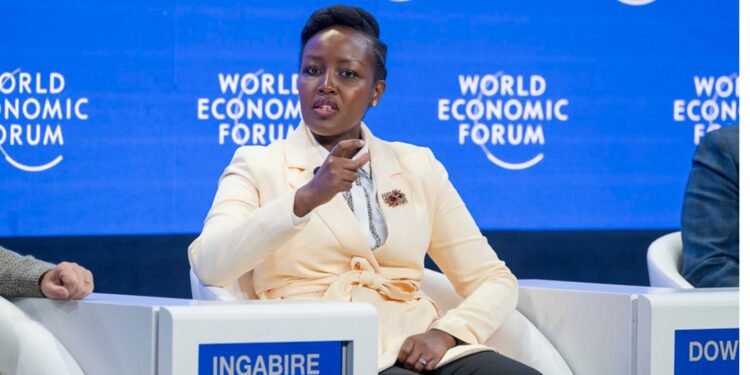DAVOS, Switzerland (BG) — While global priorities dominated discussions at the World Economic Forum (WEF) in Davos this week, a significant spotlight was placed on Africa and the pivotal role of Artificial Intelligence (AI) in shaping the continent’s future economy.
During a panel discussion titled “AI: Lifting All Boats,” Paula Ingabire, Rwanda’s Minister of ICT and Innovation, highlighted the importance of collaboration in addressing resource constraints and building foundational frameworks for AI adoption.
“We worked with Singapore to put in place a playbook for small states on how we can really create a proper roadmap on how we build the foundations for the AI economy,” said Ingabire.
She emphasized the necessity of regional collaboration in overcoming energy and data resource constraints, referencing the East African Community’s initiative to develop an energy pool.
“If there’s excess capacity in any of the countries, and one country has a sudden demand for energy because of AI workloads, then we’re suddenly able to do that,” Ingabire explained.
This model of cross-border cooperation is seen as critical for Africa’s ability to support AI workloads and drive innovation.
Leveraging Africa’s Youthful, Digitally Savvy Population
Ingabire also underscored the role of Africa’s young and tech-savvy population as a catalyst for AI adoption.
“Africa has a growing, youthful, digitally savvy population,” she noted, adding that this demographic advantage positions the continent as both a user and an early adopter of emerging technologies.
She cited Rwanda’s innovative use of drones to deliver medical supplies to rural areas as an example of how technological adoption can inspire regulatory frameworks and scalable ecosystems.
“We were able to create regulations that now many countries are benchmarking to create an ecosystem,” she added.
The minister pointed to the upcoming Global AI Summit on Africa, scheduled for April 3–4, as a significant opportunity to unify the continent’s AI strategies.
“The idea is to have a collective voice, to think together about what the priorities are in terms of adoption, what building blocks we need to put in place to coinvest as countries,” she explained.
Streamlined Policies and Shared Resources Are Key
Kristalina Georgieva, managing director of the International Monetary Fund (IMF), echoed Ingabire’s call for collaboration, emphasizing that fragmented efforts by individual countries could hinder Africa’s competitiveness in the AI economy.
“Individual countries, even the big countries in Africa, are going to lose if they don’t figure out a way to work with others,” Georgieva said.
She stressed the importance of shared regulations, streamlined policies, and fostering AI-related skills and capabilities as common public goods.
She also highlighted regional economic assessments conducted by the IMF as a potential model for fostering cooperation.
Georgieva said the IMF occasionally conducts regional economic assessments, most frequently for the Eurozone, where annual consultations are held with member countries due to their shared currency.
“I’m thinking of expanding that approach to other groupings of countries,” she said, “where there is a desire to succeed by creating common objectives,” shared resources, and public goods.
Global and Local Leadership in Focus
The discussions at Davos show the critical role of local and global leadership in creating an AI-ready workforce in Africa.
The African Union’s recent adoption of a continental AI strategy was lauded as a significant step in laying the foundation for an integrated and equitable approach to AI adoption.
Ingabire expressed optimism about Africa’s future in the AI economy, citing the progress made in regional collaborations and the potential to scale AI innovations.
“There’s really a lot of promise in how we are coming together as a continent to really drive AI adoption in an equitable manner,” Ingabire said.
The World Economic Forum in Davos, held from January 20–24, brought together experts, leaders, policymakers, and investors to engage in critical conversations on topics such as the future of AI and its impact on global economies.
By Bantu Gazette, reporting from Davos, Switzerland




